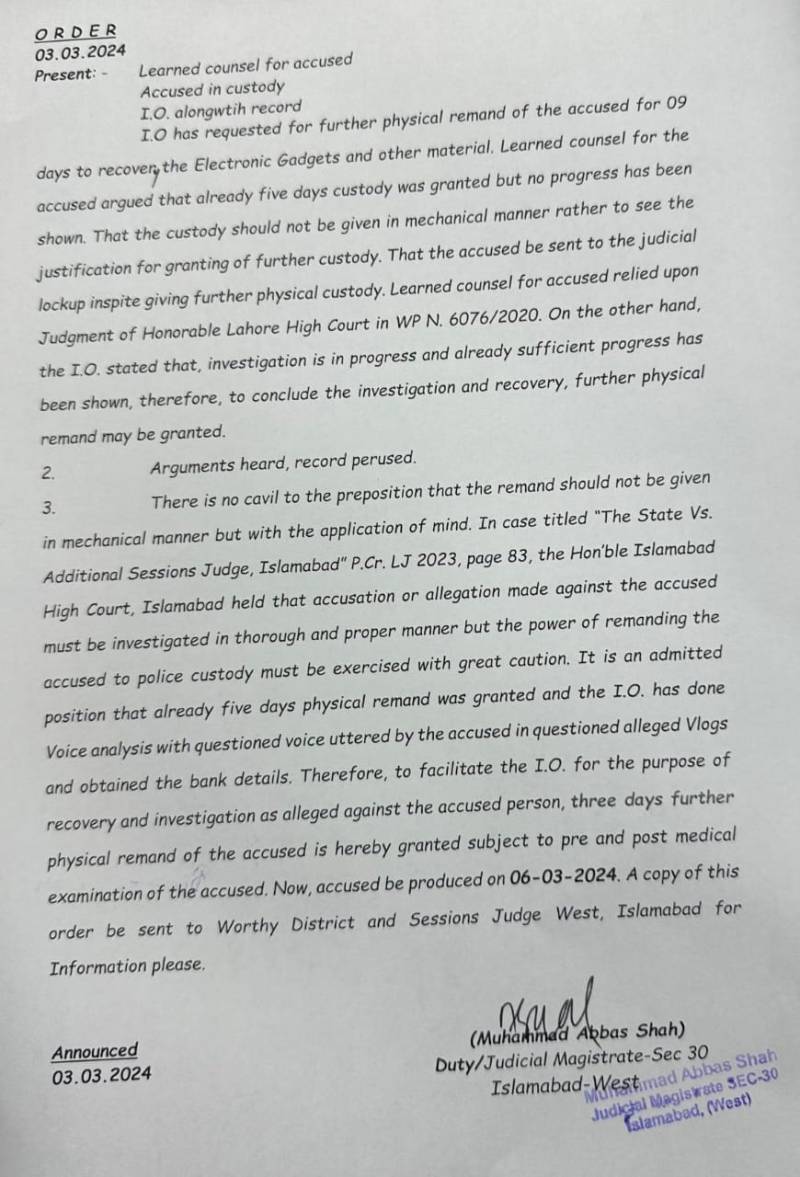
A District and Sessions Court Sunday granted the FIA physical custody of journalist and vlogger Asad Toor for an additional three days amidst an uproar in the journalist community after it emerged that the investigators were seeking additional custody of the journalist in pursuit of his information sources.
The journalist community and rights activists have termed Toor's continued physical remand as sheer harassment and attempts at curbing freedom of expression.
On Sunday, the Federal Investigation Agency (FIA) presented Toor before Duty Magistrate Abbas Shah after his original five-day remand expired.
As the hearing commenced before the duty magistrate, the FIA requested the court to extend the journalist's physical remand by nine days.
Toor's counsel, Iman Zainab Mazari and Abdul Hadi, strongly opposed FIA's plea, pointing to alleged mala fide interests of the agency.
During the hearing, Toor addressed the magistrate and said the authorities wished to keep the people silent as if the country was a graveyard.
Toor further disclosed that he has been on a hunger strike while in FIA's custody, adding that agency officials have been pursuing his digital devices, including his cellphone.
In a social media post later, senior journalist Hamid Mir claimed that the FIA were reportedly pressuring Toor to disclose the sources of his information.
This is the judicial order which allowed 3 days extension in the physical remand of @AsadAToor this order clearly allowed FIA to force a journalist to disclose his sources of information. This court order is a violation of journalist protection bill and many SC orders. pic.twitter.com/sDkAfRQmsN
— Hamid Mir حامد میر (@HamidMirPAK) March 3, 2024

Senior journalist Matiullah Jan, who was in court, claimed that accessing a journalist's phone was illegal and the practice would endanger the lives of journalists and their news sources. He further argued that it would open a floodgate of cases and punishments against journalists in Pakistan.
However, the Duty Magistrate partially agreed to the FIA's request and granted the physical remand of Toor for another three days.
It is pertinent to mention that thus far, the FIA has been unable to bring any material on the record to substantiate allegations against Toor in light of the enquiry and the FIR registered.
The FIA had arrested Toor on Monday, February 26 after he voluntarily appeared before them in response to a summon. The next day, on February 27, Islamabad Judicial Magistrate Muhammad Shabbir sent the vlogger on a five-day physical remand in FIA custody as it directed the agency to produce the accused again on March 3, 2024.
According to the FIR against Toor, the vlogger allegedly ran a malicious campaign against the judiciary on social media platforms such as X and YouTube.
It added that he had fueled anti-state activities through social media, and he has been booked under the Prevention of Electronic Crimes Act 2016.
Further remand not permitted?
Toor's lawyer, Advocate Hadim, in a message posted on the social media site 'X', formerly known as Twitter, said that the law, under Section 167 of the Criminal Procedure Code (CrPC), the High Court Rules and Order, Chapter 11, Part-B and Police Order 1934, does not permit grant of further remand for Toor.
"This is abuse of process and the law, particularly attempts to prohibit this by the use of word "shall" and multiple stages of oversight," he wrote.
The law under 167 CrPC, highcourt rules and order,chapter 11 partB and police order 1934 does not permit further grant of remand for @AsadAToor.This is abuse of process and the law particularly attempts to prohibit this by the use of word “shall”and multiple stages of oversight https://t.co/IKRXrPbhKK
— Abdul Hadi (@HadiAli115) March 3, 2024
According to Mazari, the court's order on Sunday was a classic example of why people have lost faith in the judiciary.
"The order extending Asad's remand has been passed without any application of mind," she wrote on 'X'.
She said when Asad categorically owned his content and refused to hand over his devices during his five-day detention in FIA custody, why would he hand over his devices now?
Mazari further said that the absurd demand that a journalist should hand over his/her devices must be strongly condemned by local human rights groups and the international community.
"The purpose is not investigation nor recovery - it is harassment and deprivation of liberty of a dissenting voice."
If courts can't resist this brazenly illegal and mala fide conduct, judges should go home, she said.
Meanwhile, she added, Supreme Court remains in deep slumber over an alleged "witch-hunt", while Chief Justice Qazi Faiz Isa has refused to scrap the Joint Investigation Team (JIT) altogether.
It is pertinent to mention that the Supreme Court Journalist Association has already filed a petition under Article 184(3) against harassment of journalists.
The petition had yet to be affixed for hearing till the filing of this report.
Another suo moto regarding the protection of journalists was adjourned until March 4 but has not been listed for hearing till the filing of this story.
In his vlogs, Toor has questioned the role of the military establishment in politics besides criticising the judiciary for failing to act on time and uphold the law.
Rights activists and journalists say the case was registered against Toor at the behest of the establishment in the guise of cracking down on abuse against the judiciary.
They urge Chief Justice Isa to realise that the case against Toor was bringing bad repute for the former.
Rights activists say that Toor's case has far-reaching repercussions for the profession of journalism in Pakistan, which is consistently under attack.
Barrister Salahuddin believes that guaranteeing freedom of speech
does not mean merely allowing factually correct, reasonable and inoffensive speech. It also involves forbearance and tolerating even misguided, unreasonable or offensive speech.
"That is a necessary cost of maintaining a free, plural and diverse society. If such tolerance was not displayed, it would have "a chilling effect" on all speech."
"There are, of course, boundaries to free speech. One such boundary is contempt of court. The need to ensure free speech must be balanced against the need to ensure public confidence in the judiciary. This balancing act is performed by our Courts through the invocation of the powers of contempt," believes Barrister Salahud Din.

